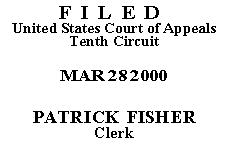

| MARK K. HOBRATSCHK,
Plaintiff-Appellant, v. MARIA D. PERRETTA, Defendant-Appellee. |
|
Plaintiff Mark K. Hobratschk, proceeding pro se, appeals from an order of the district court dismissing this action as a sanction. We affirm.
Mr. Hobratschk commenced this action alleging unlawful discrimination based on gender and national origin and unlawful retaliation pursuant to Title VII. He also alleged violations of 42 U.S.C. §§ 1981, 1983, 1985. Ultimately, by both court order and Mr. Hobratschk's request, all claims were dismissed except those against defendant Maria Perretta. Against her, Mr. Hobratschk alleged claims of battery, sexual harassment, perjury, slander and libel, and interference with employment relations in violation of Colorado state law.
The proceedings before the magistrate judges assigned to this case were contentious. Both Mr. Hobratschk and defendant's counsel were admonished several times to act professionally or risk sanctions. Both sides moved multiple times for sanctions, Mr. Hobratschk filing three motions and defendant filing eight. The first magistrate judge recommended the sanction of dismissal in October 1988 and then recused. The second magistrate judge also warned Mr. Hobratschk several times that he was subject to sanctions, including the sanction of dismissal. In May 1999, that magistrate judge also recommended the sanction of dismissal. The district court agreed with the magistrate judges' recommendations and dismissed the case with prejudice.
On appeal, Mr. Hobratschk asserts that magistrate judges are biased against pro se litigants and denied him his constitutional right to self-representation. He also contends that defendant was not prejudiced by his failure to comply with discovery orders because defendant had other means to obtain the information he did not provide. Mr. Hobratschk notes that the magistrate judges should have sanctioned defendant's counsel. Mr. Hobratschk argues that the order of dismissal is inadequate as the district court made no showing of harm to the defendant and lesser sanctions, although imposed, were never enforced. Mr. Hobratschk concludes that the magistrate judges' conduct was arbitrary and capricious and that they concealed facts from this court.
We review a court's order of dismissal as a sanction for discovery violations under the abuse of discretion standard. See Ehrenhaus v. Reynolds, 965 F.2d 916, 920 (10th Cir. 1992). Although dismissal is a drastic sanction, it is appropriate in cases of willful misconduct. See id.; see also Fed. R. Civ. P. 37(b)(2)(C) (authorizing a court to enter an order dismissing the action if a party "fails to obey an order to provide or permit discovery"). A "willful failure" is "any intentional failure as distinguished from involuntary noncompliance. No wrongful intent need be shown." Sheftelman v. Standard Metals Corp. (In re Standard Metals Corp.), 817 F.2d 625, 628-29 (10th Cir. 1987) (quotation omitted).
Before dismissing an action as a sanction, the court must examine: "(1) the degree of actual prejudice to the defendant; (2) the amount of interference with the judicial process; . . . (3) the culpability of the litigant; (4) whether the court warned the party in advance that dismissal of the action would be a likely sanction for noncompliance; and (5) the efficacy of lesser sanctions." Ehrenhaus, 965 F.2d at 921 (quotations and citations omitted). Not every case will require the district court's evaluation of all the Ehrenhaus criteria, however, as "often some of these factors will take on more importance than others." Id. at 922. "Because dismissal with prejudice defeats altogether a litigant's right to access to the courts, it should be used as a weapon of last, rather than first, resort." Meade v. Grubbs, 841 F.2d 1512, 1520 n.6 (10th Cir. 1988) (quotations omitted).
Mr. Hobratschk appears to think that the district court must first impose and enforce lesser sanctions before the sanction of dismissal with prejudice can be ordered. We have never held that. Although lesser sanctions may have been enforced prior to a dismissal, the imposition of lesser sanctions is not mandatory. See, e.g., Archibeque v. Atchison, Topeka & Santa Fe Ry., 70 F.3d 1172, 1175 (10th Cir. 1995); Jones v. Thompson, 996 F.2d 261, 265-66 (10th Cir. 1993); Ehrenhaus, 965 F.2d at 921-22.
The district court considered both the October 1998 and the May 1999 recommendations for dismissal by the magistrate judges. Both recommendations suggested dismissal with prejudice due to Mr. Hobratschk's continuing failure to comply with court orders. The court specifically considered Mr. Hobratschk's pro se status. The court noted that Mr. Hobratschk had been warned that his failure to comply with court orders would provide the basis for a recommendation of dismissal. In fact, the second magistrate judge offered Mr. Hobratschk an opportunity to correct his conduct and to pursue the case properly. However, Mr. Hobratschk continued refusing to comply with court orders. Mr. Hobratschk also sent a series of e-mails to defense counsel in which he threatened and abused counsel. Mr. Hobratschk misrepresented himself as an attorney to a potential witness, contacted a witness defendant had planned to depose and informed him that the deposition was stayed, and suggested that defendant or defendant's counsel were implicated in another person's suicide.
The district court weighed the Ehrenhaus factors and determined that dismissal of the case with prejudice was the proper sanction. Our review of the record and the materials submitted by Mr. Hobratschk confirms this determination. Mr. Hobratschk's excuses for his behavior are unavailing. His arguments on appeal are without merit. The district court did not abuse its discretion in imposing the sanction of dismissal with prejudice.
The judgment of the United States District Court for the District of Colorado is AFFIRMED. Appellee's motion to supplement the record on appeal is GRANTED. Appellant's motions to amend his reply brief are GRANTED. The mandate shall issue forthwith.
Entered for the Court
Circuit Judge
*. This order and judgment is not binding precedent, except under the doctrines of law of the case, res judicata, and collateral estoppel. The court generally disfavors the citation of orders and judgments; nevertheless, an order and judgment may be cited under the terms and conditions of 10th Cir. R. 36.3.